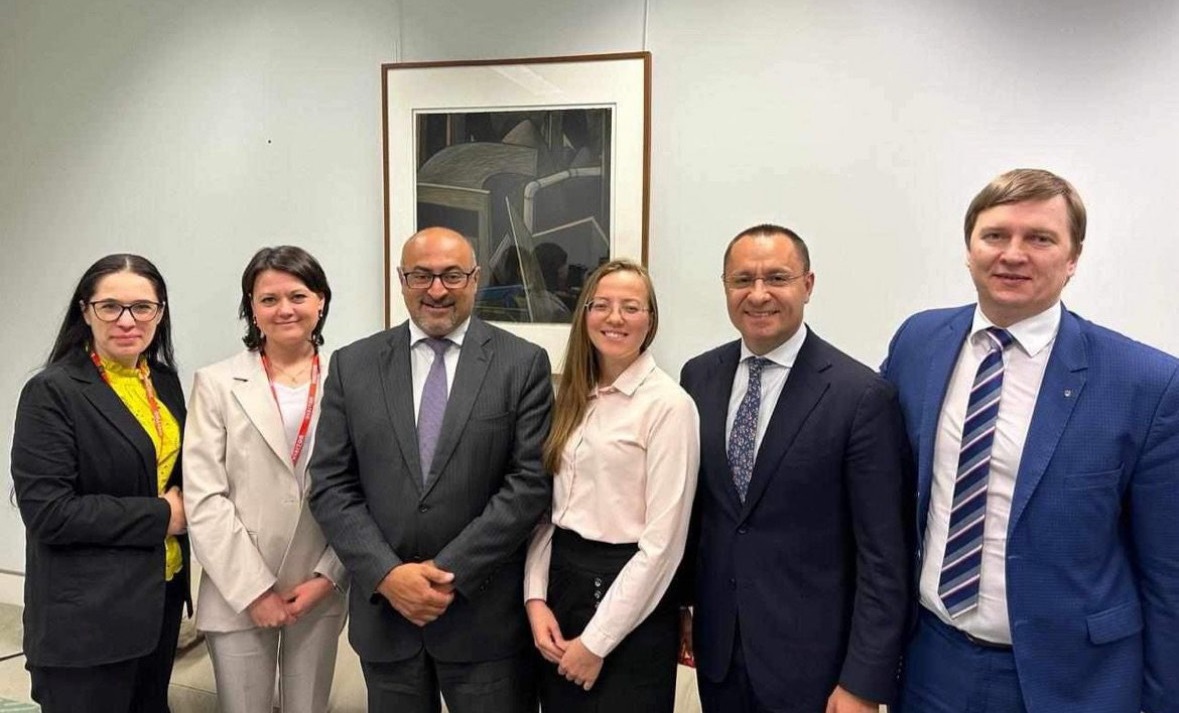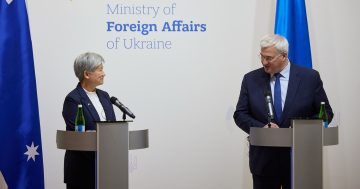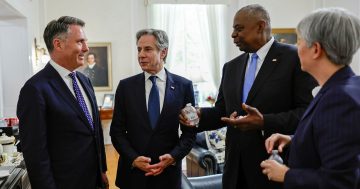
Ukrainian Prism Foreign Policy Council delegates including Yuliia Shaipova (left) in Canberra with Ukraine’s Ambassador to Australia, Vasyl Myroshnychenko (second from right). Photo: Prism.
As the North Atlantic Treaty Organization (NATO) marks 75 years, a delegation of Ukrainian security experts has travelled to allied nations to raise the profile of the war-torn country’s bid for membership and further support.
Signed in Washington, DC, on 4 April, 1949, in the aftermath of World War II to provide ”collective security against the Soviet Union”, the alliance has since grown from its 12 foundation members to 32 nations, with Finland and Sweden joining last month.
Now, three-quarters of a century later, Ukrainian experts are drawing on historical horrors to sound the alarm on the fragility of global security.
Yuliia Shaipova was among the security experts visiting on behalf of the Ukrainian Prism Foreign Policy Council, delivering a new report on Ukraine-Australia bilateral relations to local officials.
Ms Shaipova said a focus on geopolitical tensions and China’s increased presence throughout the Indo-Pacific region were among the key areas of the document, which has not yet been publicly released.
”As one of the largest Pacific partners to the United States, Australia could help by advocating and drawing parallels between the situation in Ukraine and the situation in the Pacific,” Ms Shaipova said.
“Something happening in the Black Sea could as well be happening in the South China Sea and so something happening in Europe could soon become part of the reality in the Pacific.”
It comes as Defence Minister Richard Marles pointed to a major shift in the army’s force projection resulting in the scrapping and downsizing of some military projects.
His comments ahead of next month’s federal budget were made during a speech at the Sydney Institute on Thursday night (4 April).
”We don’t see that the future is about fighting a land war on the Australian continent,” he said.
”We do see that what we need with our army is to be making our contribution to regional security, so in that sense, we’re enhancing army’s ability.”
Ms Shaipova said strengthening relations between the two nations was mutually beneficial for many reasons, including Australia’s ability to be ”Ukraine’s eyes into the Indo-Pacific” and provide a greater understanding of the complexities and context at play.
She also advocated for the return of Australia’s embassy to Ukraine, after staff were relocated to Poland in February 2022.
”Most embassies have returned and they have strict security measures, so it could be a great way to show consistency of the support,” she said.
”And the systemic nature of it would also help Australia to see more of what’s happening on the ground because maybe Australia would be able to see the situation more clearly and with more urgency.”
Former US ambassador to Poland Paul Jones shared similar sentiments towards Ukraine’s ambitions for NATO membership.
”The debate and the discussion should be how Ukraine adds to the alliance in terms of defence capability,” he said.
“As well as in terms of values, [it would be] another step toward the completion of Europe as a whole and free continent. Poland is obviously very strongly in favour [of accession to membership for Ukraine].”
NATO members agree that an armed attack against any one of them in Europe or North America would be considered an attack against them all, prompting concern about the timing of granting NATO membership to Ukraine amid the ongoing conflict given President Vladimir Putin’s public statements that Russia was ”technically ready for nuclear war” and that if the US sent troops to Ukraine it would be considered a significant escalation of the conflict.
Undeterred by this theory, the former ambassador, who was posted to Poland from 2015 to 2018, said the counterargument was the need for Ukraine to continue strengthening the alliance’s military might.
”I would just take us back to 2013 when the entire eastern flank was nervous of Russia, who later invaded Ukraine in 2014,” he said.
“In 2015, I was looking over communications and the Polish people had quite emphatically warned the US administration in 2010 of Russia’s intentions in Ukraine particularly.
“So I think bringing Ukraine in [as a member] is a strength, and making the alliance stronger is our best argument.”
The former ambassador’s comments were made during a press briefing to mark the 20th anniversary of NATO’s largest-ever expansion of members, with Bulgaria, Estonia, Latvia, Lithuania, Romania, Slovakia and Slovenia, and following the 25th anniversary of the accession of the Czech Republic, Hungary and Poland.
At its July annual summit in 2023, alliance members voted to simplify NATO’s path to accession, removing the requirement for Kyiv to submit a Membership Action Plan, which is designed to help candidates meet certain political, economic and military criteria.




